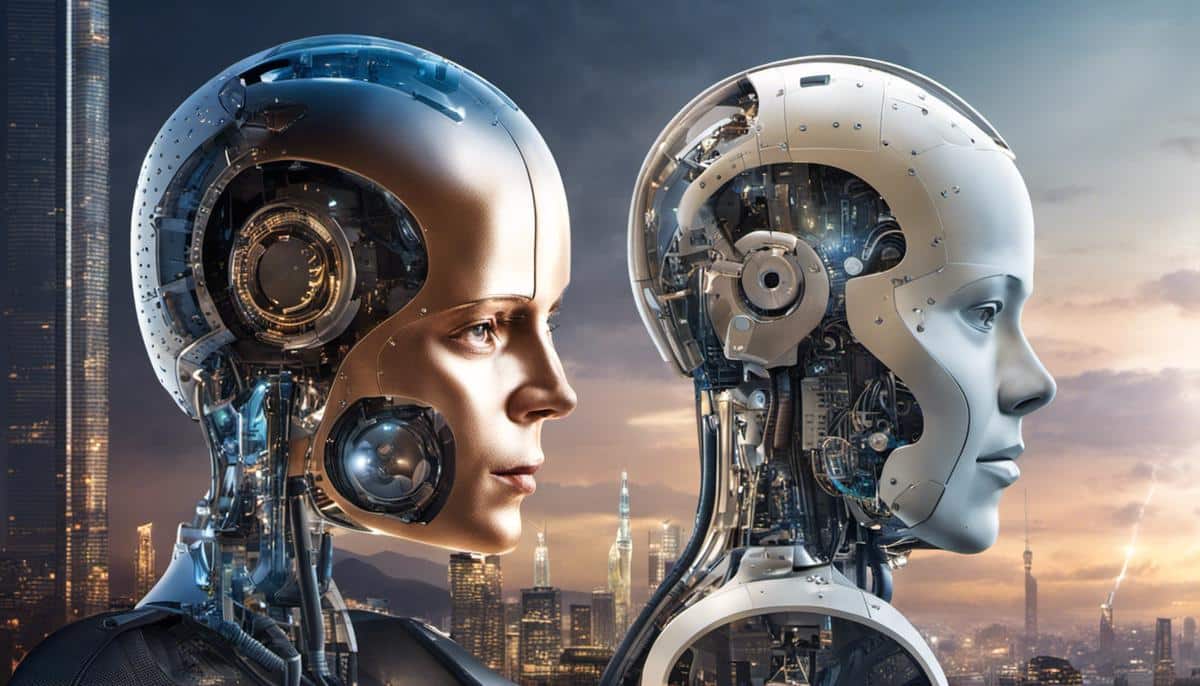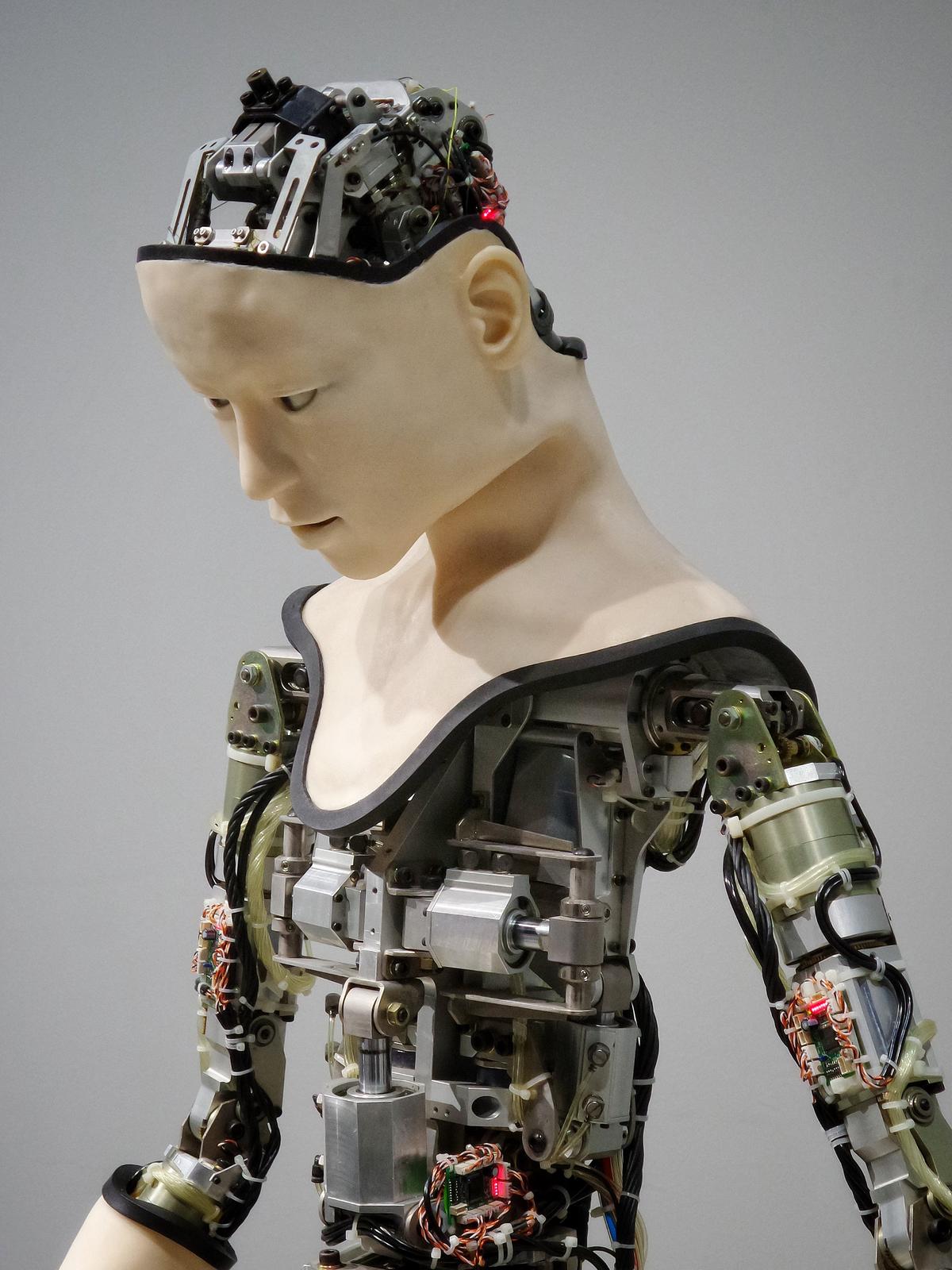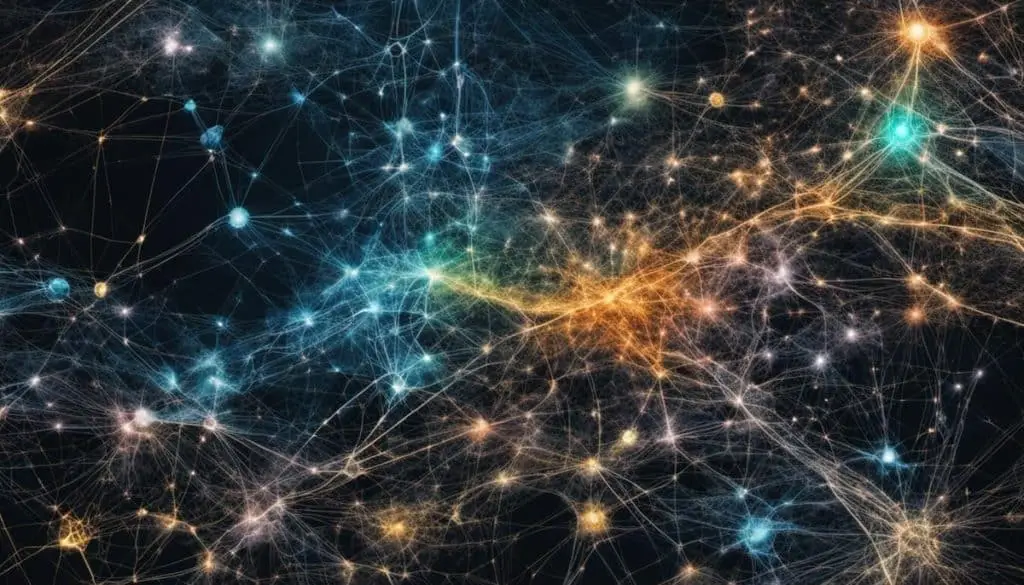In the whirlwind of technological advancement that the 21st century has brought forth, few innovations have sparked as much intrigue, debate, and even fear, as Artificial Intelligence (AI). From dissecting its nascence and understanding its complex tenets–ranging from machine learning to deep learning and neural networks–to witnessing its extraordinary evolution, AI has permeated virtually every sector of modern human society. It is transforming health, education, economy, and the social structure by altering traditional job roles, birthing new ones, and revolutionizing the very nature of work. Nevertheless, AI’s influence on society, its potential to transcend human intelligence, and the role humans might play in an AI-dominated world are questions that demand insightful exploration and balanced discourse.
Understanding AI
The Evolutionary Journey of Artificial Intelligence: A Chronicle of Its Origin and Development
Artificial Intelligence (AI), once a concept relegated to the realm of science fiction, has permeated our everyday existence at an astonishing speed. Conceptualized as a tool to mimic human intellect, AI has evolved considerably since its inception—profoundly influencing and shaping myriad sectors from healthcare to entertainment, and education to finance. But what precisely do we mean when we speak of artificial intelligence?
AI can be defined as a bevy of technologies that enable computing machines to mimic human-like cognitive functions and problem-solving skills. It’s an interdisciplinary field amalgamating computer science, linguistics, psychology, mathematics, and other scientific domains, striving for the creation of machines that can think, learn, adapt, and essentially, behave like humans.
Its infancy can be traced back to the mid-20th century. In the summer of 1956, a pivotal meeting took place at Dartmouth College, effectively marking the birth of artificial intelligence as a legitimate discipline. Here, pioneers such as John McCarthy, Marvin Minsky, Allen Newell, and Herbert Simon laid out the ambitious goal to construct complex machines that had identical abilities as human intelligence.
Through the 1960s and 70s, AI was primarily symbolic, largely based on predefined rules and algorithms. However, these rule-based systems came under scrutiny due to their lack of flexibility and inability to ‘learn’. The limitations of symbolic AI highlighted the need for more dynamic approaches.
The advent of Machine Learning in the 1980s infused a fresh perspective into the AI narrative. Instead of programming specific tasks, researchers began to develop algorithms that can learn from data and improve through experience, hence offering greater adaptability and predictive accuracy.
The recent surge in AI’s prominence is attributed to developments in Deep Learning—a subset of machine learning—which employs artificial neural networks modeled after the human brain to ‘learn’ from large amounts of data. Today, technologies like self-driving cars, voice assistants, fraud detection systems, and recommendation algorithms owe their existence to these advancements.
The trajectory of AI development has been noted for its oscillating periods of progress—termed AI ‘springs’—and setbacks—referred to as AI ‘winters.’ These cycles reflect the complexity and intrigue surrounding AI, equally characterized by profound breakthroughs and overzealous expectations.
In the field of artificial intelligence, evolution has been both relentless and fascinating, brimming with monumental challenges and breakthroughs. From its humble beginnings in theoretical conjecture to a tangible force that permeates various aspects of our lives, AI continues to reshape our understanding of what machines are capable of. As researchers, it’s our mandate to perpetuate this momentum of AI evolution, ensuring its trajectory aligns with ethical considerations and societal development. Because, indeed, the future of artificial intelligence is not found—it’s built.

AI’s Influence on Human Society
Following the basic understanding of Artificial Intelligence (AI) and its inception, it becomes essential to detail the ways this ground-breaking discipline is reshaping multiple aspects of human society. Far beyond its implications in technology or business spheres, AI is transforming education, healthcare, transportation, and the very way we interact with our world.
For instance, AI’s integration in the realm of education has proven to be a game-changer. Adapting to each student’s unique learning abilities, AI-driven tools offer personalized study materials, predict performance, and signal potential areas of weakness, thereby supporting a diverse learning path for every student. Even teachers are benefiting from AI, which aids in reducing their administrative load, thereby providing additional time for meaningful student engagement. AI adoption in education imparts a significant shift from the traditional ‘one size fits all’ model, steering towards a more inclusive, precise, and assists based learning strategy.
In healthcare, AI has emerged as a key player by aiding in disease detection, patient care, drug development, and predictive analysis. The AI models leverage big data, drawing meaningful patterns to identify potential health risks, hence, allowing early interventions and tailor-made treatment plans. Increasingly sophisticated AI applications like computer vision and natural language processing have transformed radiology and pathology by enhancing diagnostic capabilities and boosting overall healthcare outcomes.
The transport industry represents another fascinating domain witnessing extensive AI implementation. Autodesk vehicles and intelligent traffic management systems are redefining the means by which goods and people traverse from one point to another. Through machine learning techniques, these systems can analyze a copious amount of data in real-time, leading to safer, efficient, and eco-friendly travel experiences.
Notwithstanding such progress, the presence of AI also raises unique challenges and dilemmas. The obliteration of jobs due to automation or the potential misuse of AI are stark realities that society is grappling with. robust regulatory frameworks, transparency in AI models, emphasis on human-AI symbiosis, and efforts towards an inclusive AI ecosystem become critical elements in this evolving narrative of co-existence.
Moreover, the advent of AI engenders unprecedented ethical considerations. The intrinsic neutrality of AI systems can be colored through the unintended incorporation of biases during the developmental stages, thereby resulting in skewed decisions. It becomes incumbent then to embed ethical considerations and stringent vetting processes right from the AI’s inception, development, and operation.
As AI continues on its trajectory of increasing involvement across the societal nexus, it is essential to engage in a dialogue that is both introspective and anticipatory. Only by navigating the AI-dominated landscape with éclat and responsibility can the myriad benefits of this revolutionary technology be realized while mitigating potential risks. Indeed, the reshaping of human society by artificial intelligence is not a question of if, but how and when.

AI’s Supremacy: A Reality Or A Myth
As the discourse around artificial intelligence (AI) extends beyond the realms of academia and research, an intriguing question frequently arises: are we heading towards an era where AI dominates humans, or is such a thought merely speculative?
To delve into this conundrum, it’s crucial to precisely understand the full capacities of present-day AI. Much of the AI seen today functions within the spectrum of Narrow AI. This term represents AI systems designed to undertake specific tasks, such as voice recognition or recommendation systems. While these entities exhibit a striking capacity in undertaking assigned tasks, they lack a comprehensive understanding or consciousness that will enable them to ‘dominate’ humans in the traditional sense.
The feared realm of science tells us about Artificial General Intelligence (AGI), a hypothetical AI that possesses the ability to understand, learn, and apply knowledge across a wide array of tasks, akin to human intelligence. Although the concept of AGI fascinates the scientific community and the public alike, its realization remains tentative, and may even be a perpetually unattainable goal. Thus, in considering the current and foreseeable state of AI, domination by AI remains speculative.
However, other dimensions of this discussion deserve attention. One is the economic dominance potentially conferred by AI. Transitioning from manual to AI-based tasks potentially significantly augments productivity and efficiency, making labor markets and economies increasingly reliant on AI. Although such reliance should not be misconstrued as ‘domination’, it undeniably shifts substantial power into the hands of those who control AI technologies, raising legitimate concerns about societal balance and equity.
The ethical and societal implications of AI are other critical aspects. As AI’s integration into various sectors intensifies, potential biases embedded within AI systems remarkably influence decision-making, from loan approvals to prison sentences. Such biases may result in a latent form of ‘domination’, where AI-driven outcomes significantly sway the direction of human life.
In conclusion, the conjecture of AI dominating humans in the traditional sense remains speculative. However, the influence and dependence on AI in economic, societal, and ethical landscapes bear significant implications. Open discourse, anticipatory governance, robust regulation, and relentless scrutiny of AI systems will be instrumental not just in mitigating these concerns, but in shaping a future where AI serves instead of ‘dominates’ humanity.

Photo by possessedphotography on Unsplash
Role of Humans in the AI-Dominated World
Understanding the Position of Humans in an AI-Dominated World
As our civilization ventures towards an age where artificial intelligence (AI) plays a substantial role, one question of grave importance arises: “What will be the role of humans in a world dominated by AI?” While the connotations associated with a world dominated by AI may differ based on perspective, one thing is clear: Humans will continue to play a critical role, regardless of how widespread and significant the uses of AI become.
The conception of AI has undoubtedly transformed various sectors of society, with revolutionary impacts in fields such as healthcare, education, transportation, and more. Yet, amidst these transformative changes, the role of humans evolves, rather than diminishes. Humans assume roles that require a distinctly human touch, such as ethical decision-making, critical analysis, and providing emotional intelligence, among others.
Empathy, for instance, is a uniquely human attribute that AI can strive to imitate but never truly master. Roles that demand deep empathy, such as therapists and social workers, continue to stand unchallenged, even in a world commanded by AI.
Similarly, positions that require proficiency in strategic thinking or creativity will naturally resist AI erosion because of their innate requirement for innovative, ‘outside-the-box’ thinking. For instance, roles held by research scientists, strategic consultants, and artists will remain relevant due to the human intuition and innovation they demand.
This human-centric world features a knowledge economy, where the society leverages the ingenuity of AI to amplify our creativity and intellect rather than displacing it. Here, humans embrace lifelong learning, continually adapting to the dynamic landscape of knowledge and skills, to partner symbiotically with AI rather than compete against it.
Moreover, humans remain indispensable in AI oversight and ethics. AI systems, regardless of how self-learning or autonomous they become, lack moral consciousness, an inherent human trait. Providing ethical boundaries, scrutinizing AI decisions for biases, and identifying misuse of AI systems are tasks intrinsically suited for humans. We will need jurists, ethicists, and regulators to ensure that society uses AI ethically and equitably.
Lastl, and quite intriguingly, the rise of AI elevates exciting human roles that deal with AI directly. These include AI trainers, who escort AI systems through their learning processes, explainers who bridge the gap between AI decisions and human stakeholders, and sustainers, who ensure the ethical use of AI.
In conclusion, even in an age dominated by AI, the role of humans will not become obsolete; instead, it will simply evolve. We will pivot from roles that AI can automate efficiently to ones where our inherent human characteristics take center stage. AI’s increasing prevalence conveys a reminder for us to value our unique human traits more, such as our emotional intelligence, creativity, ethical judgment, and the ability to think abstractly. Even in a world surging in artificial intelligence, there’s no replacement for genuine human intellect and touch.

As we gaze into the limitless expanse of the future, we must confront the reality of a world progressively shaped by AI’s supremacy. The specter of machines outperforming humans in various scenarios persists, raising important concerns and ethical considerations. However, we must also appreciate the potential of a harmonious human-AI partnership, utilizing AI not as a replacement, but as an augmentation of human abilities. The interplay between human intuition and AI’s computational power might forge innovative collaborations, fostering a humane-centred approach to AI. This new relationship may not only determine the future trajectory of society but also shape the way we perceive and adapt to AI’s increasing influence.






